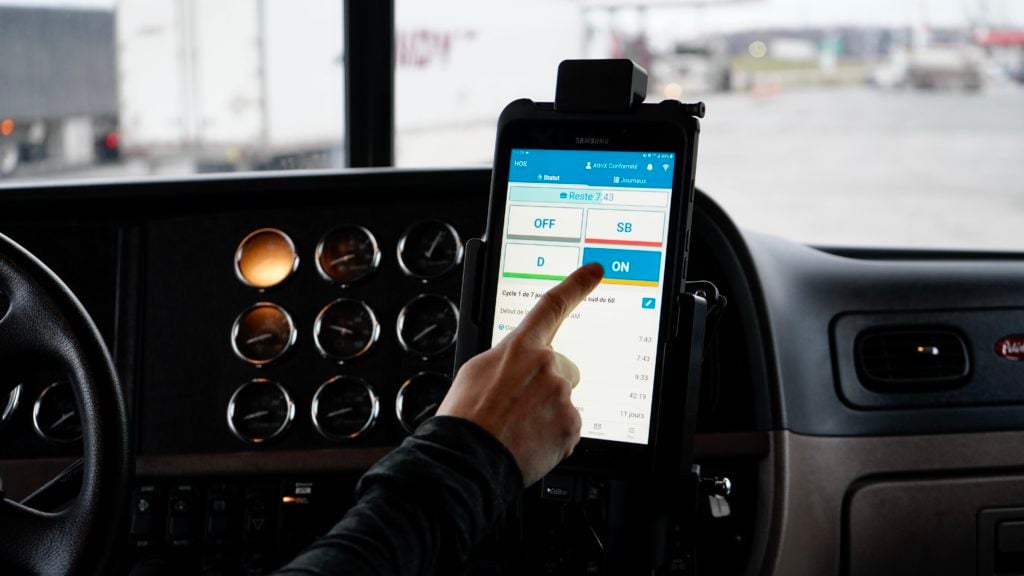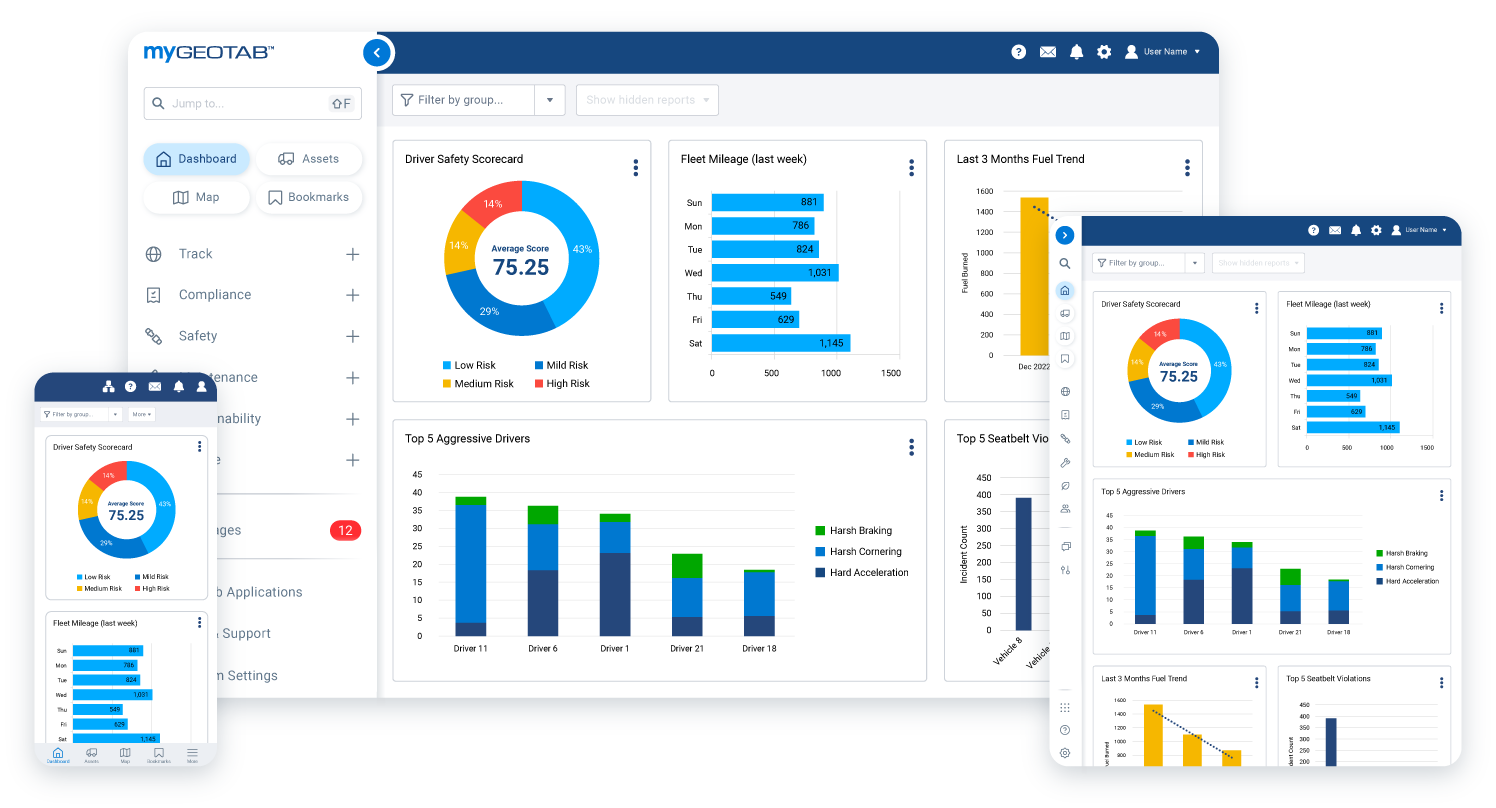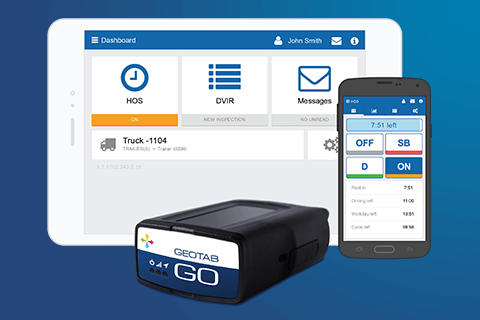Commercial Fleet Management: Strategies, Tools & Tips
Commercial fleet management plays a vital role in keeping businesses running smoothly, especially in industries like transportation, logistics, and...
Keep an eye on the road
Simplify your driver's routine
For efficient decision making
Ensure the compliance of your fleet
Simplify the daily life of your drivers
Maximize the value of your data
Unparalleled monitoring of your assets
The friendly competition that pays off
Planning powered by data
Exceed your customers' expectations
Provide better service to your users
Maximize the satisfaction of your citizens
Simplify your daily life on the construction site
Facilitate the electrification of your fleet
Our experts meet your needs
Easily meet the standards
Improve the safety of your drivers
Protect your data and your fleet
6 min read
Miguel Lage
Sep 5, 2024 2:31:13 PM

The regulation of Electronic Logging Devices (ELDs) has brought major changes to the Canadian transportation industry. However, not all fleets are affected by this obligation. Specific exemptions allow certain drivers and companies to comply with rules tailored to their particular operations. Understanding these exemptions is essential to avoiding fines, staying compliant with the law, and managing your transportation activities effectively.
In this article, we take a closer look at these exemptions and their implications for Canadian transporters.
ELDs were introduced to modernize and enhance safety in the transportation industry. This mandate arose from growing concerns about driver fatigue and the handling of paper logbooks. Beyond simple compliance, DCEs aim to ensure that Hours Of Service (HOS) are respected, thereby reducing fatigue-related accidents.

In 2021, Canada made the use of ELDs mandatory for the majority of motor carriers operating under federal jurisdiction. This measure aligns with the regulations in force in the United States, enabling greater harmonization for cross-border carriers. However, Canada has ensured that implementation will be gradual, with delays to allow the industry to adapt.
This initiative has several objectives:
While federal regulations mandate the use of ELDs for carriers operating inter-provincially and internationally, each province retains the option of regulating intra-provincial operations. Some provinces, such as Alberta and Saskatchewan, have chosen to delay or adapt the application of the mandate, making the situation complex for fleets operating solely within a province.
This means that it is essential for carriers and drivers to understand not only the national regulations but also the specific requirements of each province to comply. This provincial divergence creates a need for heightened vigilance for companies operating in multiple jurisdictions.
The Canadian government has set aside a transition period to enable companies to adopt ELDs without haste. Indeed, this technology represents a major investment, both in terms of equipment and staff training. This gradual approach has been designed to limit disruption to the industry while ensuring widespread compliance over the long term.
In short, the regulation of ELDs is essential to ensure greater safety on Canadian roads, while providing more effective management tools for carriers. However, the legislative framework varies from province to province, requiring a nuanced understanding of the applicable obligations.
Although the adoption of electronic logging devices is an important milestone in the regulation of transportation in Canada, many drivers and vehicles may be exempted from this obligation. These exemptions exist for a variety of reasons, whether related to the nature of the operation, the technical characteristics of the vehicle, or specific permits granted to carriers. Here is an overview of the main exemptions to which it is important to pay attention.

Certain fleets operating under special permits benefit from an exemption from ELDs. These permits may be issued for various reasons, such as temporary operations or emergencies. In such cases, the paper logbook remains valid, and drivers do not have to install an ELD in their vehicle.
Vehicles leased for less than 30 days are exempt from the requirement to have an ELD installed. This allows greater flexibility for companies that do not own their fleet, but rely on temporary rentals to meet seasonal demand or specific needs.
Trucks manufactured before the year 2000 are exempt from the obligation to have an electronic consignment device. This exemption is due to technical reasons: these older vehicles are often incompatible with the technology required for ELDs. However, carriers must ensure that these trucks still comply with other safety and operating regulations.
Drivers operating within a 160 km radius of their terminal also benefit from an exemption, provided they return to their point of departure at the end of each working day. These drivers do not need to use an ELD to record their hours, although appropriate documentation must be kept to prove compliance. This exemption is particularly advantageous for local or regional operations.
Certain specialized operations, such as driveaway (the movement of new vehicles from factories), as well as the transport of agricultural equipment or certain products such as fertilizers, may also be exempt from ELD requirements. Authorities recognize that these sectors have unique and sometimes temporary needs, justifying different regulations.
In Canada, while the mandate for electronic consignment devices is imposed federally for carriers operating inter-provincially, the rules vary considerably at the provincial level. This regulatory diversity allows some provinces to adopt a different application schedule, or even propose additional exemptions for intra-provincial operations.
Some provinces, such as Alberta, Saskatchewan and Prince Edward Island, do not yet impose strict requirements on local carriers. These provinces have taken the time to defer the application of the ELDs, allowing intra-provincial fleets to continue operating under the old paper-based system in some cases. In Saskatchewan, for example, ELD legislation has not been applied as quickly as in other more densely populated provinces.
Nunavut, due to its geographic isolation and the unique nature of its transportation infrastructure, is also exempt from the ELD obligation for the time being. Local operations there are often adapted to extreme environmental conditions, making it difficult to implement electronic devices immediately.
Each province is free to decide if and how it applies the ELD regulations to fleets operating exclusively within its borders. This sometimes creates situations where a driver may be exempt in one province, but subject to the obligation in another when crossing provincial boundaries. These variations require carriers, especially those operating close to several provinces, to pay close attention to local regulations.
One of the major difficulties for transport companies is navigating this regulatory mosaic. While the federal objective is to standardize rules to ensure safety and fairness, some provinces prefer to adjust their requirements according to their economic and geographic reality. As a result, carriers often have to juggle federal and provincial requirements, especially for small companies operating only within provincial borders.
In short, provincial exemptions are an inescapable reality for drivers and transport companies in Canada. It is therefore essential to understand the regulations specific to each province to avoid any compliance problems. Keeping on-board documentation up to date, and staying abreast of local legislative changes, is key to maintaining smooth operations.
Certain transport operations benefit from specific provisions exempting them from the obligation to use electronic lockout devices. These exemptions exist to meet the unique needs of certain industries or situations, where the installation of an ELD might be impractical or unnecessary.
Companies specializing in driveaway operations - where drivers move vehicles that are not their own, often new vehicles in transit to dealers or buyers - are exempt from the ELD obligation. In this type of operation, it is often impossible to install an ELD permanently on these vehicles due to the temporary nature of their driving. Vehicle towing may also benefit from this exemption in specific cases, where driving is more incidental to the main operation.
Vehicles involved in the transport of agricultural products or specialized equipment such as fertilizers may also be exempted from using an ELD. This type of transport, which is often seasonal, may be accompanied by specific exemptions, particularly when operations are limited in time or involve short journeys in rural areas. Indeed, these vehicles can operate in environments where the use of an ELD would be less relevant, such as farms or specialized logistics warehouses.

Small fleets and owner-operators operating in local or regional areas may also be eligible for exemptions. Often, these drivers operate within a 160 km radius of their terminal, exempting them from using an ELD if they return to their point of departure daily. The exemption allows small companies to avoid the costs of installing and managing ELDs, while still complying with safety requirements.
Certain exemptions apply to temporary operations, such as those carried out with vehicles leased for less than 30 days. These exemptions are particularly important for transporters who need to meet seasonal or ad hoc demands without needing to equip their temporarily leased vehicles with ELDs. Similarly, in emergencies, it may be impossible or inefficient to comply with strict ELD requirements, thus justifying these exemptions.
Failure to comply with electronic lockout requirements can have serious consequences for both drivers and transport companies.
One of the main repercussions of non-compliance is the possibility of receiving fines. These financial penalties can vary according to the seriousness of the offence, ranging from simple warnings to heavier fines for repeat or serious offenders. For example, if a driver is found without an ELD when it is compulsory, the fine can be significant, especially if it impacts HOS.
For carriers, these fines can add up quickly if several vehicles are non-compliant, or if the offence is detected during a roadside check outside the home province, where regulations may be even stricter. In the long run, these costs can be detrimental to a company's profitability.
In the event of repeated non-compliance, the authorities can go beyond simple financial fines. A company's operating permits can be temporarily suspended, or even revoked if the infraction is deemed serious. Such a suspension can be devastating for a business, paralyzing operations for several days or weeks, and causing even greater financial losses.
For drivers, failure to use an ELD when required can result in suspension of their driving license, preventing them from working during the period of suspension.
Non-compliance can also affect a company's reputation. In a sector as competitive as transport, reliability and compliance are crucial factors in maintaining customer confidence. A company that accumulates fines or suspensions risks seeing its credibility diminish, which can lead to the loss of contracts and customers. What's more, non-compliant transport companies may also find themselves blacklisted by certain business partners, who refuse to work with carriers with a dubious reputation.
Companies that fail to comply with ELD rules are likely to be subject to stepped-up checks at future roadside inspections. Authorities may become stricter with carriers who have already been caught breaking the rules, which can lead to further delays in deliveries, costs associated with inspections, and more complex management of operations.

Commercial fleet management plays a vital role in keeping businesses running smoothly, especially in industries like transportation, logistics, and...

In fleet management, fleet compliance services play a much bigger role than just checking a box. They’re about keeping your drivers safe, your...

Trucking has always come with its fair share of challenges, from road safety and liability issues to managing fleet efficiency. As the industry...